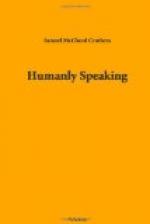We make acquaintance with people by the same method. The recognition of identity depends upon the ability which most persons have of appearing to be remarkably like themselves. The reason why we think that the person whom we met to-day is the same person we met yesterday is that he seems the same. There are obvious resemblances that strike us at once. He looks the same, he acts the same, he has the same mannerisms, the same kind of voice, and he answers to the same name. If Proteus, with the best intention in the world, but with an unlimited variety of self-manifestations, were to call every day, we should greet him always as a stranger. We should never feel at home with so versatile a person. A character must have a certain degree of monotony about it before we can trust it. Unexpectedness is an agreeable element in wit, but not in friendship. Our friend must be one who can say with honest Joe Gargery, “It were understood, and it are understood, and it ever will be similar, according.”
But in the use of this effective method of reiteration there is a difference between nature and a book. Nature does not care whether she bores us or not: she has us by the buttonhole, and we cannot get away. Not so with a book. When we are bored, we lay it down, and that brings the interview to an end. It is from the fear of our impatience that most writers abstain from the natural method of producing an impression.
And they are quite right. It is only now and then that an audience will grant an extension of time to a speaker in order that he may make his point more clear. They would rather miss the point. And it is still more rare for the reader to grant a similar extension in order that the author may tell again what he has told before. It is much easier to shut up a book than to shut up a speaker.
The criticism of Dickens that his characters repeat themselves quite misses the mark. As well object to an actor that he frequently responds to an encore. If indicted for the offense, he could at least insist that the audience be indicted with him as accessory before the fact.
Dickens tells us that when he read at Harrogate, “There was a remarkably good fellow of thirty or so who found something so very ludicrous in Toots that he could not compose himself at all, but laughed until he sat wiping his eyes with his handkerchief, and whenever he felt Toots coming again he began to laugh and wipe his eyes afresh.”
“Whenever he felt Toots coming again”—there you have the whole philosophy of the matter. The young fellow found Toots amusing when he first laid eyes on him. He wanted to see him again, and it must always be the same Toots.




